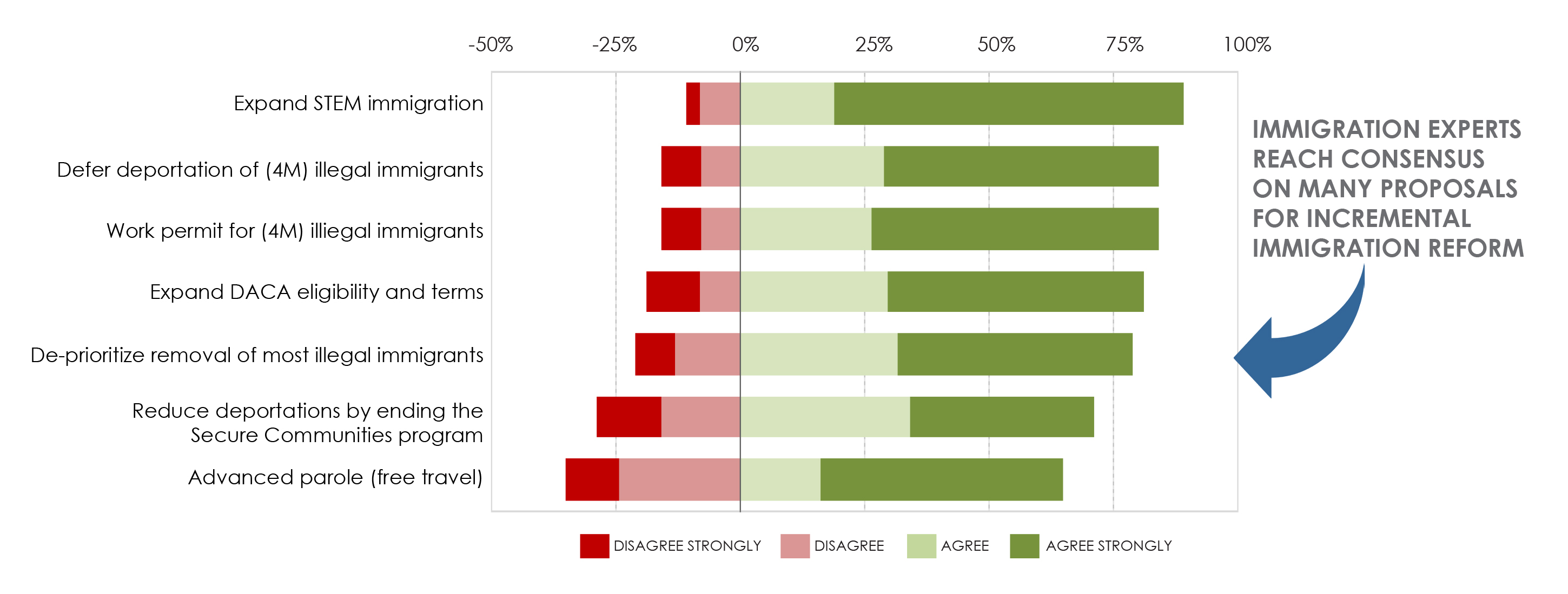President Obama announced executive action about how the U.S. would enforce immigration law on November 20, 2014, accompanied by multiple official memos from the Department of Homeland Security and other executive branch agencies responsible for enforcement. While much attention has focused on the President’s most visible action to defer deportation of a class of illegal immigrants by granting a 3-year temporary status to those who register, he actually took nearly a dozen distinct actions.
We asked a panel of 39 immigration policy experts to review the legal, economic, and political implications. Our first question highlighted seven of the actions that seem the most important and/or contentious. The second question put to the panel asked them to assess whether these exact same policies “would be good for the United States if they were passed by congressional legislation.” (emphasis original).
QUESTION: In your estimation, which of the announced actions did President Obama have Constitutional authority to take? (The percentages of experts that affirm executive authority are noted next to each action).
|
49% EXPAND NUMBER OF IMMIGRANT "INVENTORS, RESEARCHERS, AND FOUNDERS OF START-UP ENTERPRISES." First, an expanded number of EB-2 employment based green-card “waivers” will be granted to individuals with an advanced degree or “exceptional ability” in their field. Second, a new program will grant parole status to entrepreneurs with high potential for job creation and/or secure financing (but would not be legal status or a pathway to citizenship). |
|
67% DEFER DEPORTATION ACTIONS AGAINST A CLASS OF ILLEGAL IMMIGRANTS. This program grants temporary deportation relief for parents of U.S. citizens or lawful permanent residents, an estimated population of 3.9 million. Applicants for the temporary 3-year status must pay a fee and pass a background check. This action does not technically grant legal status or a pathway to citizenship. |
|
51% WORK PERMITS FOR UNDOCUMENTED IMMIGRANTS. Beyond deferring deportation, a new Homeland Security memo directs U.S. Citizenship and Immigration Services (USCIS) to “Issue all work authorization documents valid for three years” to those undocumented immigrants who are parents of U.S. citizens or lawful permanent residents. With the work permit, these individuals are allowed to apply for and receive Social Security cards and driver’s licenses (in most states). |
|
64% EXPAND DACA ELIGIBILITY AND PERIOD OF PROTECTION. The Deferred Action for Childhood Arrivals (DACA) program was initially a 2-year status limited to undocumented immigrants under the age of 31 who as children had been brought to the United States before June 15, 2007. The expanded DACA removes the age cap, adjusts the entry date to 2010, and increases the relief to a 3-year status. |
|
69% DE-PRIORITIZE REMOVAL OF MOST UNDOCUMENTED IMMIGRANTS. A new DHS enforcement and removal policy will set priorities for deportations (“removals”) on national security threats and criminals. “Under this revised policy, those who entered illegally prior to January 1, 2014, who never disobeyed a prior order of removal, and were never convicted of a serious offense, will not be priorities for removal.” Although not a pathway to citizenship, this memorandum seems to establish a permanent new status quo. |
|
69% REDUCE DEPORTATIONS BY ENDING THE SECURE COMMUNITIES PROGRAM. DHS will end the Secure Communities program, and replace it with the Priority Enforcement Program (PEP) that reflects new priorities. The program will continue to rely on fingerprint-based biometric data submitted during bookings by state and local law enforcement agencies, but will no longer mandate deportation of undocumented immigrants considered lower priority. |
|
54% ADVANCED PAROLE WHICH ALLOWS SOME UNDOCUMENTED IMMIGRANTS TO TRAVEL ABROAD AND FREELY RETURN. One of the new memos from DHS directs USCIS that “when anyone is given ‘advance parole’ to leave the country – including those who obtain deferred action – they will not be considered to have departed.” Undocumented aliens generally trigger a 3- or 10-year bar to returning to the United States when they depart, making travel effectively impossible, but this action creates a de facto travel visa. |
Do you agree with the following ideas for reform of U.S. immigration policy?

All seven of the policy actions are deemed by a majority of our scholars to be “good for country” but the policy scores are significantly higher than the responses recognizing presidential authority in three cases. Ironically, the policy considered most beneficial was considered the least legal when passed by executive memorandum.
It should be noted that the legal precedents developed over decades around deferred action on deportations are based on individual cases, not as applied here to classes of millions of people. However, deferred action has been coupled by precedent with authority to work inside the United States, and very recently by allowing individuals to travel outside the United States and return as if on a legal visa. We decoupled those three functions in the survey, and found a clear distinction in the perceptions of legal authority.
For the full list of surveyed experts, click here.















